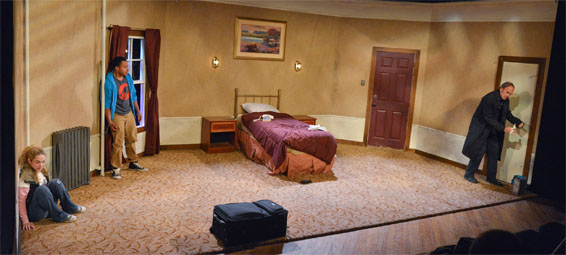The world of Irish playwright Martin McDonagh’s A Behanding in Spokane, produced by Second Thought Theatre and running through Jan 26, begins with both a whimper—coming from the closet of the crummy motel room–and a bang, from the gun wielded by Carmichael, a hulking, unwashed guy with one hand (Van Quattro). We learn soon enough that the severed appendage has been missing for some 27 years, and Carmicheal has not yet mastered the fine art of letting go. He’s obsessed. He wants it back.
This is McDonagh’s first foray into an American setting, and his signature, darkly comedic sensibilities translate into something a bit sillier than his other work. The story revolves around two bumbling would-be criminals trying to sell our creepy guy a hand while the increasing bizarre motel clerk, Mervyn (Drew Wall), thrusts himself directly into the fray. McDonagh hits most of his right notes: obsessive, manic, maniacally burnt out characters, existing in total filth, but leans too heavily on the cheesy jokes that sound like they came out someone’s very first improv class and the sort racial stereotyping that even an individually talented actor, such as the one in this play, cannot overcome. That aside, it’s gleefully macabre, and director Alex Organ tunes us in fast.
Our criminal duo is Marylin (Barrett Nash, lackluster in an already cookie-cutter role) and Toby (David Jeremiah, glib and smart, doing what he can with what again is more of cardboard cut out of a so-called stereotypical black man than a character), an interracial (trust me, this matters) young couple trying to pull a fast one on Carmicheal. Or rather, they’ve already tried it, and now they’re trying to bluff themselves out of the dark scary hole they’re digging for themselves. Carmichael does not strike us, from the very beginning, as a paragon of forgiveness. He is, however, a fan of revenge, handcuffs, and the DIY explosive, consisting of a can of gasoline, a rag, and a candle. And then there’s the aforementioned gun. It’s not too long before people are chained to a wall and the body parts start actually flying.
Quattro plays Carmichael an the obsessive, possibly murderous sad-sack; scary enough, but oddly sympathetic. But it is Wall’s hotel clerk who steals this particular show, with his gum-chomping, fast-talking ways and wild-eyed stare. He strikes us as even more dangerous than the man with the firearm, because he, as Carmichael even remarks, seems indifferent to whether he lives or dies. More than that, though, he has little care for the lives of our two lovebirds, who desperately, desperately want to live. Everything about Wall’s performance, from the staccato delivery to his eyes to the quiver of his mouth, is enthralling. We miss his crackling energy when he leaves the stage, and delight in the way everyone seems to sharpen around him. For all the joking around, Mervyn becomes the most deadly serious person in the play, anchoring us in a storm of racial epithets and tiny side plots involving Carmichael’s mother, while still making us laugh. But it’s the unsettled kind, the shivery, slippery feeling. Revel in it.






